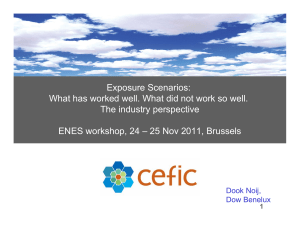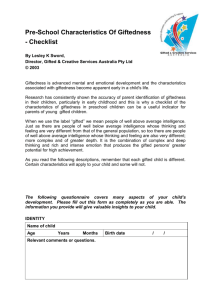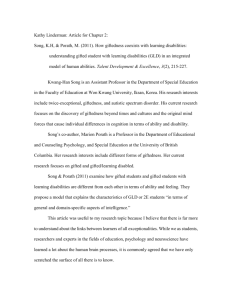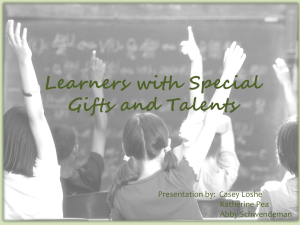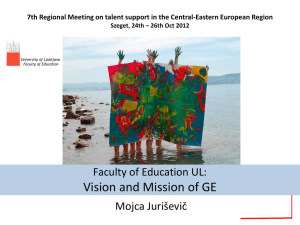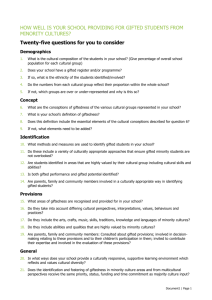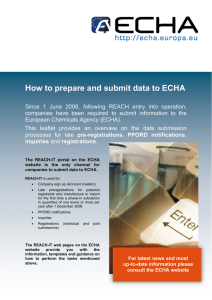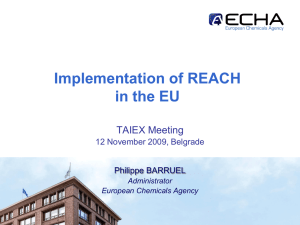Report form the 14th international ECHA conference: Re:thinking
advertisement
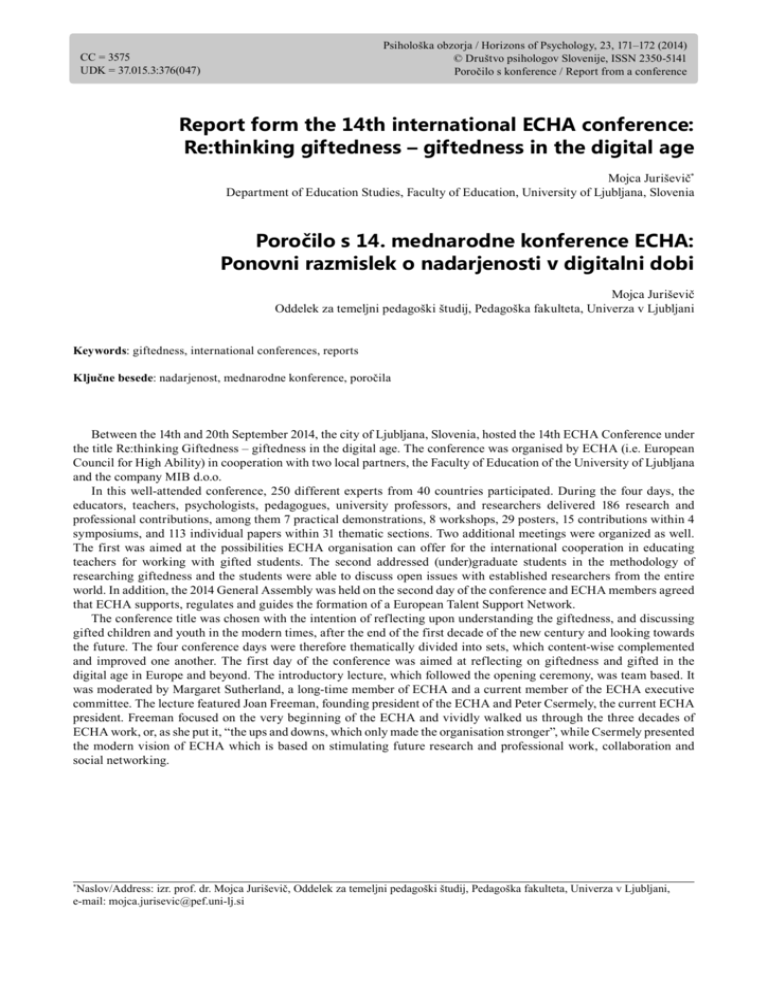
Psihološka obzorja / Horizons of Psychology, 23, 171–172 (2014) © Društvo psihologov Slovenije, ISSN 2350-5141 Poročilo s konference / Report from a conference CC = 3575 UDK = 37.015.3:376(047) Report form the 14th international ECHA conference: Re:thinking giftedness – giftedness in the digital age Mojca Juriševič* Department of Education Studies, Faculty of Education, University of Ljubljana, Slovenia Poročilo s 14. mednarodne konference ECHA: Ponovni razmislek o nadarjenosti v digitalni dobi Mojca Juriševič Oddelek za temeljni pedagoški študij, Pedagoška fakulteta, Univerza v Ljubljani Keywords: giftedness, international conferences, reports Ključne besede: nadarjenost, mednarodne konference, poročila Between the 14th and 20th September 2014, the city of Ljubljana, Slovenia, hosted the 14th ECHA Conference under the title Re:thinking Giftedness – giftedness in the digital age. The conference was organised by ECHA (i.e. European Council for High Ability) in cooperation with two local partners, the Faculty of Education of the University of Ljubljana and the company MIB d.o.o. In this well-attended conference, 250 different experts from 40 countries participated. During the four days, the educators, teachers, psychologists, pedagogues, university professors, and researchers delivered 186 research and professional contributions, among them 7 practical demonstrations, 8 workshops, 29 posters, 15 contributions within 4 symposiums, and 113 individual papers within 31 thematic sections. Two additional meetings were organized as well. The first was aimed at the possibilities ECHA organisation can offer for the international cooperation in educating teachers for working with gifted students. The second addressed (under)graduate students in the methodology of researching giftedness and the students were able to discuss open issues with established researchers from the entire world. In addition, the 2014 General Assembly was held on the second day of the conference and ECHA members agreed that ECHA supports, regulates and guides the formation of a European Talent Support Network. The conference title was chosen with the intention of reflecting upon understanding the giftedness, and discussing gifted children and youth in the modern times, after the end of the first decade of the new century and looking towards the future. The four conference days were therefore thematically divided into sets, which content-wise complemented and improved one another. The first day of the conference was aimed at reflecting on giftedness and gifted in the digital age in Europe and beyond. The introductory lecture, which followed the opening ceremony, was team based. It was moderated by Margaret Sutherland, a long-time member of ECHA and a current member of the ECHA executive committee. The lecture featured Joan Freeman, founding president of the ECHA and Peter Csermely, the current ECHA president. Freeman focused on the very beginning of the ECHA and vividly walked us through the three decades of ECHA work, or, as she put it, “the ups and downs, which only made the organisation stronger”, while Csermely presented the modern vision of ECHA which is based on stimulating future research and professional work, collaboration and social networking. * Naslov/Address: izr. prof. dr. Mojca Juriševič, Oddelek za temeljni pedagoški študij, Pedagoška fakulteta, Univerza v Ljubljani, e-mail: mojca.jurisevic@pef.uni-lj.si 172 M. Juriševič The next three days of the conference were marked by the exchange of the varying contents. They were aimed at reflecting on (1) the open possibilities brought by the digital age in the area of working with gifted students (i.e. education, consulting, research and clinical practice), (2) the modern trends of research and further evolution of the field (i.e. new research areas and innovations), and (3) the horizons which are recognizable in the given areas (how to use advantages/strengths and avoid threats in the meanwhile). The key note speakers, the eminent European researchers Albert Ziegler, Norbert Jaušovec and Marta Fulop presented the “state of the art” in the current practice of working with gifted students, neurophysiologic findings regarding the brains of the gifted, and competitiveness as one of the prevailing features related to the today’s lives of gifted students. Their thoughts echoed with the conference attendees and presenters, and their topics related to other contributions presented in other forms of delivery. The conference participants were equally inspired by the invited speakers: Shelya Blumen (Peru), Jasna Cvetković Lay (Croatia), Csilla Fuszek (Hungary), Lianne Hoogeveen (The Netherlands), Martin Kubala (The Czech Republic), Slavica Marsić (Serbia), Peter Merrotsy (Australia), Carrie Winstely (UK), and Frank Worrell (USA). Thanks to modern technology the conference attendees were additionally honoured by the evening lecture delivered by Mihaly Csikszentmihalyi, one of the founders of positive psychology, who through a video conference discussed his positive view on the role and influence of the digital age on the evolution of creativity as the central human activity. Reviewing the research and professional contributions (represented relatively equally), which ran parallel or sequentially during the conference, it seems as if the trend of the professional and research efforts in working with gifted students is moving mainly towards researching various specific opportunities for a healthy personal development of the gifted young people as well as a quality of their education and career development that allows an optimal realisation of their potentials. Moreover, the key role of teachers and/or mentors in these processes was explicitly highlighted. Illuminating presentations and rich discussions which were triggered among the conference participants showed that European experts have a lot of knowledge and expertise which are based on sound empirical basis. This is a positive outcome and should serve as strong encouragement and stimulation for researchers and educators to continue with their efforts in the future. You can read more about the conference on the conference web page https://www.echa2014.info. The conference Programme and Abstract Book can be downloaded on the web site of the Centre for Research and Promotion of Giftedness at the Faculty of Education, University of Ljubljana: http://www.pef.uni-lj.si/ fileadmin/Datoteke/CRSN/dogodki/E_ECHA_Zbornik_ 2014.pdf. Prispelo/Received: 24.3.2015 Sprejeto/Accepted: 27.3.2015
